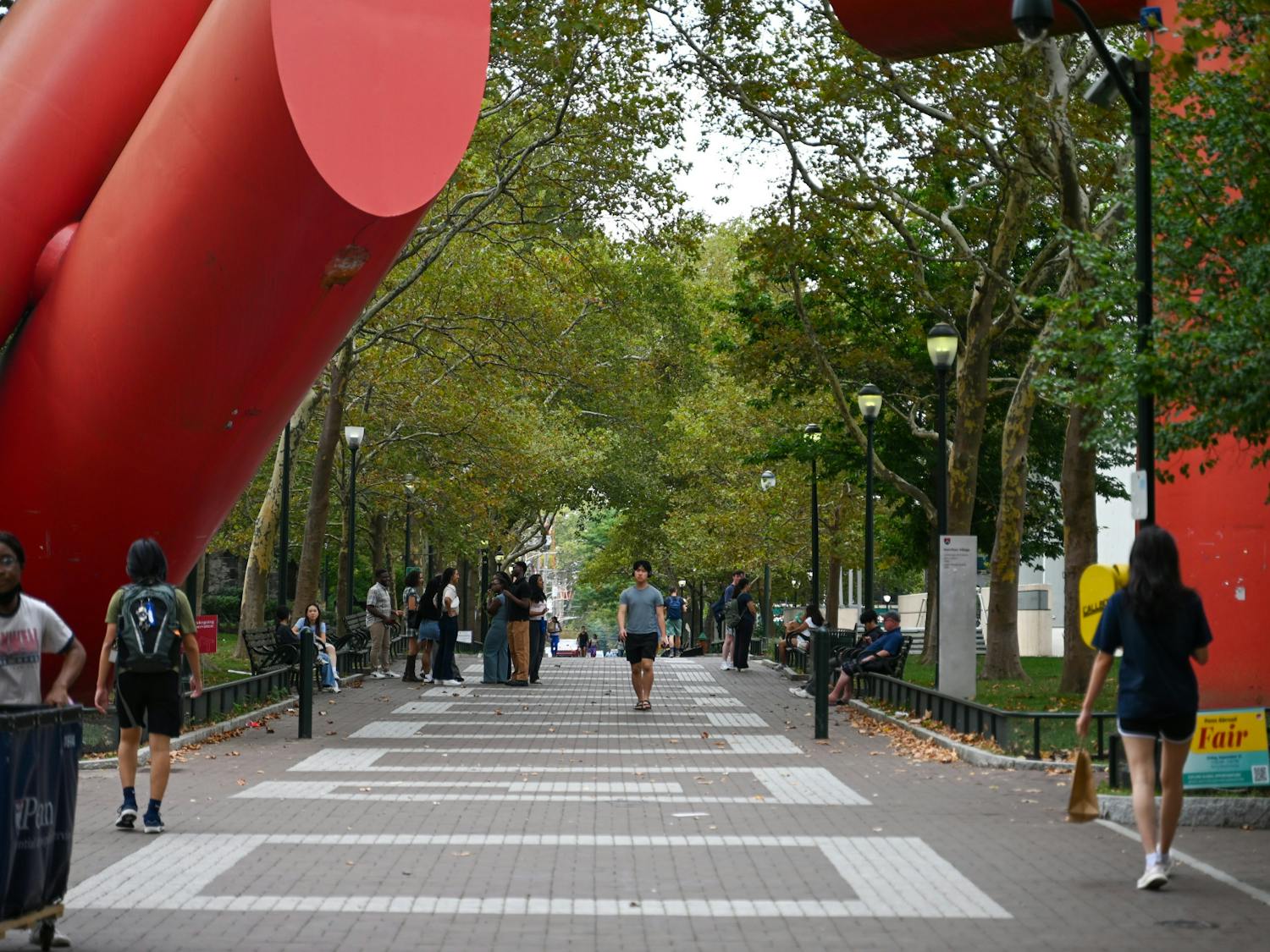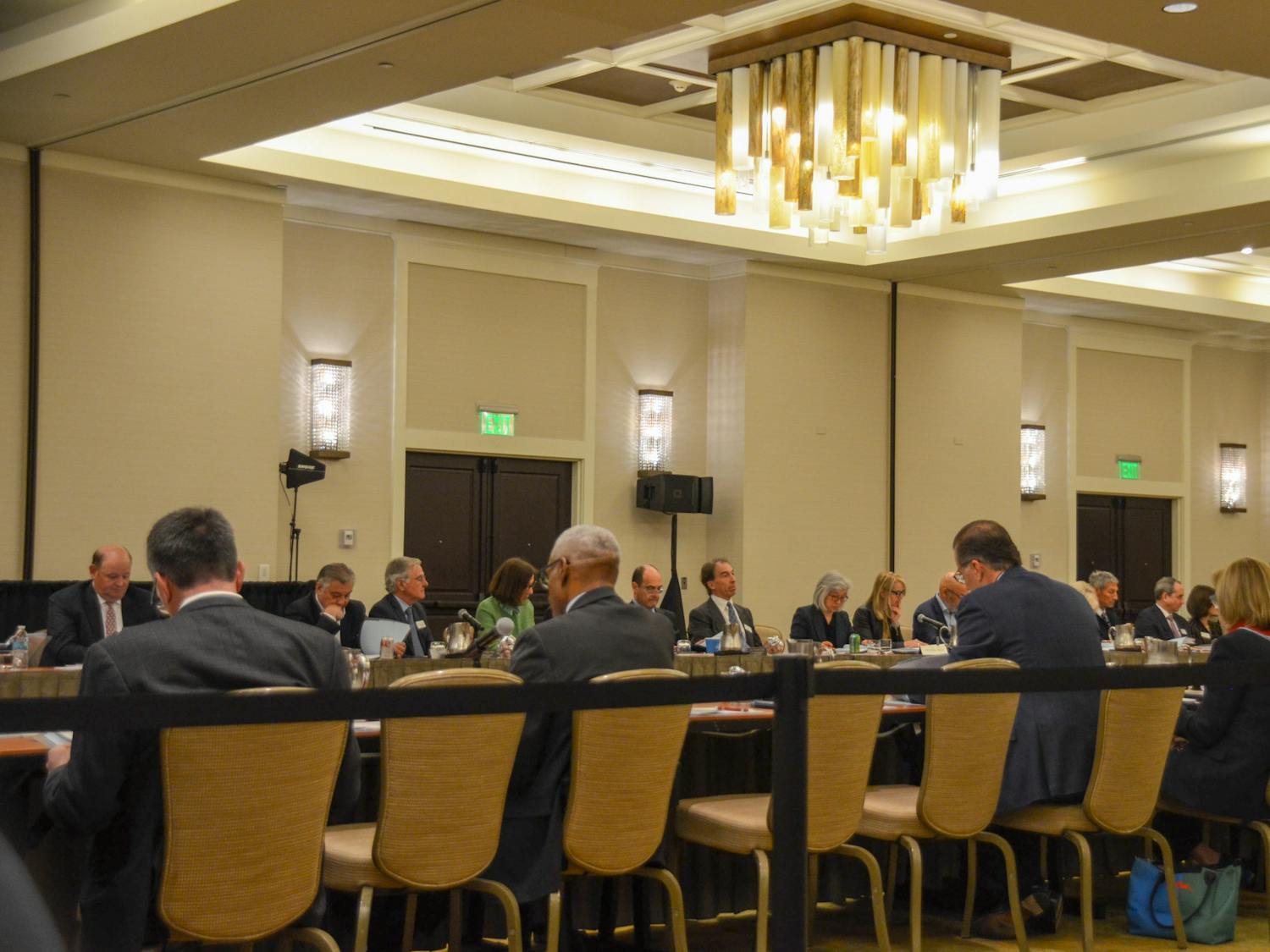He sees himself as a champion of the poor and downtrodden. His books, which include the classics The Age of Jackson and 1000 Days: Kennedy in the White House, clearly define who on the wrong side of morality -- the upholders of privilege, position and the status quo are the villians. To Schlesinger, the men in white hats are the upholders of democracy and those who reject their privileged status to serve The People -- the Jeffersons, Jacksons, Kennedys and Roosevelts. Once criticized for his moderate stance on the Vietnam War, the City University of New York professor now vehemently denounces U.S. involvement in the Persian Gulf conflict. Schlesinger took time out of his busy day at the University last week to talk to The Daily Pennsylvanian's Damon Chetson and Peter Spiegel about his views on the war, the domestic scene, unrest in the Soviet Union and anything in between. DP: As a scholar of presidential history, how do you think George Bush will be judged by history on his handling of the Persian Gulf conflict? Schlesinger: I think it will depend, on a large part, on how long the war is and how many American lives are lost. If the war is over in the next month, I think George Bush will be regarded as a brave and perceptive statesman. If the war is still going on a year from now, people will, by that time, wonder what in the world we are doing there, and why did we allow ourselves to get into war in a part of the world so remote from our interests. DP: Do you think the war will last more than a year? Schlesinger: I would doubt it, but one of the things about war, like everything else, is that they are quite unpredictable. Once a war starts, many things are set into motion. When the Soviet Union went into Afghanistan, all the experts predicted the Red Army would win in a few months. They left ten years later defeated. But in view of the totally unexpected things that have happened in the last half dozen years which no one predicted, it would be very reckless to try to predict anything that's going to happen in the future. But about Bush's handling of the thing, people sometimes have asked me, "How does this compare with the way Kennedy handled the [Cuban] Missile Crisis?" I think Kennedy and Bush have slightly different philosophies about this. Kennedy, in his inaugural address, said "We must never negotiate out of fear, but we must never fear to negotiate." And during the Cuban Missile Crisis, he would say, that it is always a great mistake to push your adversary against a locked door, and I think we have been pushing Saddam Hussein against a locked door. Kennedy, during the Cuban Missile Crisis, was always very concerned about giving Khruschev a semi-honorable way out. We've been demanding unconditional surrender, and he felt maybe negotiations would erode at this point although, I think Khruschev is obviously a more rational figure than Saddam Hussein, but still I wish we would have given negotiations more of a try. DP: Do you think the recent offer of peace in a joint statement with the Soviets represents a movement in the administration towards peace? Schlesinger: I think there has been a divergence, not a major divergence, but a minor divergence, between the State department and White House all along. I think Jim Baker, Secretary of State, is a dealmaker at heart. I think he was always hoping to make an appeal to avert the war. He proposed the "no invasion" pledge, and a possible negotiation of grievances between Iran and Iraq if Iraq would withdraw unconditionally. So I think Baker would now like to stop the war. and I think Baker feels keenly that we must keep the Soviet Union on board. One of our basic problems is we don't know anything about the Middle East, we have limited historical experience there and we don't understand the culture, language, or the religion or anything else. And I just don't to what extent Saddam Hussein is some sort of sacrificial figure, who thinks that martyrdom would be fine. Or to what extent he's a rational figure. That's worth testing out. DP: Do you think George Bush was bullied by his generals into war? Schlesinger: You don't bully presidents on the whole. I think he saw it in rather stark terms and felt that the only thing Saddam Hussein was going to understand is force. DP:How do you think this crisis compares to the Vietnam conflict? I think there's a difference in that we started to back our way into Vietnam over a period of years. We began with Truman and then got more involved with Eisenhower, and still more involved with Kennedy and then Johnson Americanized the war in 1965 when we finally sent the combat troops. This was so incremental a process, and we suddenly found ourselves quite deeply involved without quite knowing it. There was a moment during the Gulf of Tonkin resolution where there was a casual debate, but that was debated on false grounds because the Congress was assured that this was not a declaration of war, and it preceded the argument of ground forces by some months. Here on the other hand this isn't a war we backed into or wandered into somewhat idealistically. This is a war which we deliberately embraced and began. We initiated this war. It followed a kind of congressional debate. At so late a stage, however, it couldn't have arrested very much. I would think we entered this much more with our eyes open than we did the other one. DP: Was the way Bush pushed it perhaps unconstitutional in that he did not really approach Congress in an earlier stage? Schlesinger: No, I think he met Constitutional standards. I think he certainly got a postponement as long as he did by getting the U.N. resolution continued, of course Congress does not have to go along, presidents have done that before. But the Constitution set forth congressional authorization. He received that authorization. DP: Do you think that the recent activism about the war on campus is a signal that we're beginning to shift back to a more liberal mindset? Schlesinger: I think there are many indications that there's a turning of the tide as far as the political movement of the country is concerned . . . It does seem to me that the 1990s are going to be much more like the 1960s and the 1930s with the Progressive movement than they're going to be like the 1980s or 1950s. I think there's a visible revulsion with the greed aspect and notion of every man making a fast buck for themselves. DP: The nation is currently facing economic ruin, urban decay and political stagnation. Do you think that this war was caused by any of these factors. Do you think Bush sought to divert American public attention from domestic issues with the war. Schlesinger: I don't think so . . . I think he really believes that our vital interests are involved out there, and believes that this is a make or break test for security, that the U.N. has been long paralyzed by the cold war and has now been liberated by the end of the cold war to do what this intended for it to do. This is the first opportunity for them to do it, and it's a great test and a great time to build a foundation for collective security and a new peace system for the new world order. I think he genuinely believes that. DP: He believes that, but do you believe that? Schlesinger: I don't believe it. I think that had we stuck with his original policy which was collective economic sanctions, that that would have been much stronger way of strengthening and promoting collective security. If international peaceful coercion would work, they would very much strengthen their peace-keeping capabilities. I'm afraid that if we have something in which a war takes place which is an American war, with American generals, 90 percent American troops, 90 percent American casualties that it may discredit the U.N. by making the U.N. seem purely a tool in the matter of American affairs. So I think that we would achieve George Bush's objectives better by giving the sanctions a real chance to work. DP: What effects do you think the war will have on our political and economic climates? Schlesinger: It depends how long it lasts. If it ends soon, it's going to be a great plus for Bush, though he still has a recession. DP: Do you think that once the body count starts coming over from the ground war, public opinion could really undermine the effort? Schlesinger: I think we need people to reexamine the case. I think people are enthusiastic about the war now, partly because there's a rally around the flag. There's a lot of patriotic emotion about the war. There's television, you can't see the war, no one's getting hurt . . . The more casualties there are, the more they will reexamine the assumption that the U.S. has stakes in the Gulf justifying the deaths of sons, brothers, husbands. American people can take a lot, they're a strong, brave people. In the second world war, people accepted the fact, they reexamined the situation they felt th issues in the war were worth the risk of sacrificing their sons, brothers, husbands. In the Vietnam war, they decided they weren't. I think they may decide that here if this goes on long. DP: What about the chance of a draft? Do you think a protracted ground war could eventually lead to a draft? Schlesinger: I would think so. DP: Any idea how long? Schlesinger: I have no idea. I do believe there should be a draft if we're going to go through this. And it should be a draft without educational exemption. I think the reason for that is that the one way to focus attention on the war and to increase opposition to it is to have the sons and daughters of opinion makers subject to the draft. So long as we had the legislation of the 1960s, opinion makers of this country were in favor of the war, a war that was being fought by poor whites and blacks. All of a sudden in 1968 . . . when their own sons suddenly became subject to the draft, they began to wonder if what was going on in Vietnam was worth it . . . They decided it wasn't and turned against the war. That was a real shift against the war. DP: Can we really say safely the cold war is over, is that a safe assumption to make?
The Daily Pennsylvanian is an independent, student-run newspaper. Please consider making a donation to support the coverage that shapes the University. Your generosity ensures a future of strong journalism at Penn.
Donate







